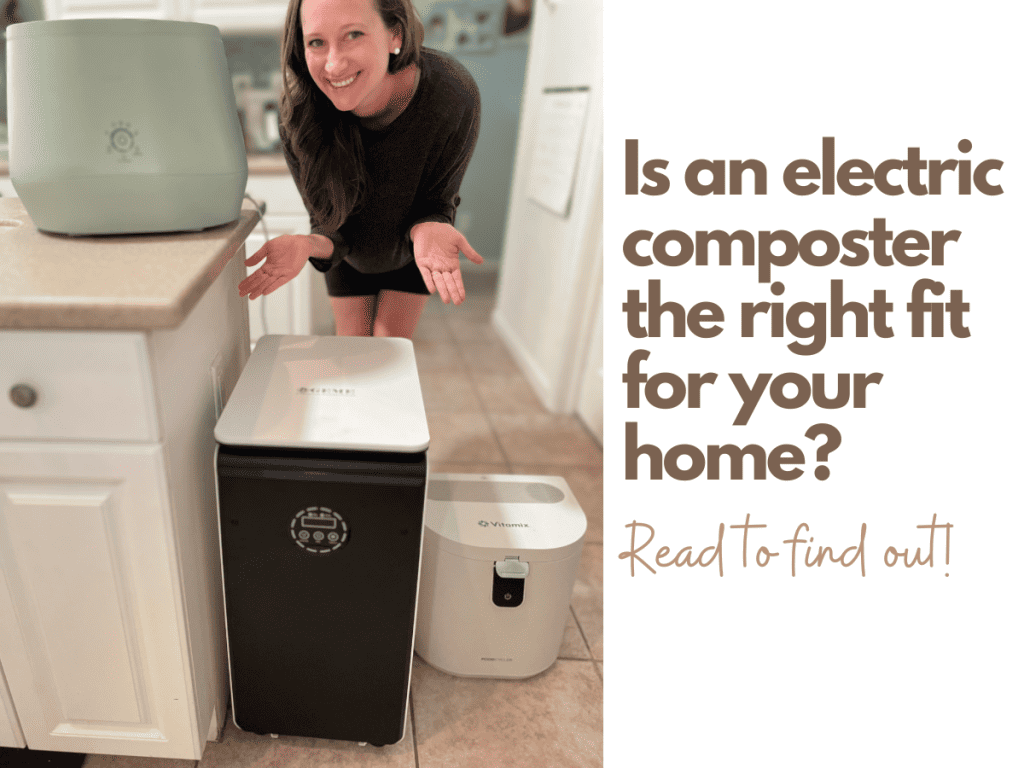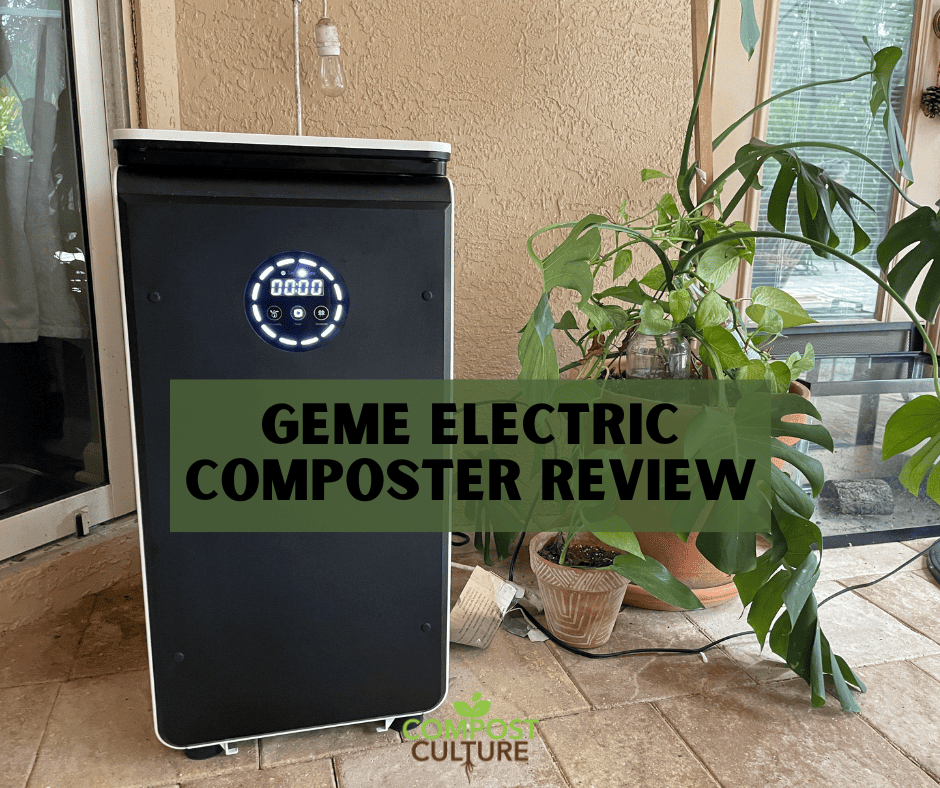This post may contain affiliate links. I may receive commissions for purchases made through links in this post.
Electric kitchen composters have been all the rage for a few years now, but do you really need one? Well, it depends on your compost situation and your finances. Don’t be swayed by influencers just because they are telling you to buy a Lomi by Pela or a Vitamix Food Cycler electric composter. Take a look at your specific situation and see if you have alternative ways to reduce your food waste before investing in a smart waste appliance.
If you find that you don’t have the space or time for traditional compost methods, and you have the money for an electric composter, then you might be a great candidate for one. Let’s take a deeper dive into the pros and cons of using electric composters and smart waste appliances to help you determine if they are the right choice for your specific circumstances or if you’d benefit more from a worm bin or a community compost program.
What is an electric composter and why do people use them?
An electric composter, also known as an electric kitchen composter, an indoor electric composter, or a smart waste appliance, is a kitchen appliance designed to accelerate the composting process for food scraps and organic waste. Unlike traditional composting methods that rely on natural decomposition with the help of microorganisms, an electric composter uses technology to break down organic matter quickly and efficiently.
Most electric composters are simply dehydrators and grinders. The finished product is not actually finished compost. Instead, it is a soil amendment that can either be added to soil or composted further in another bin. Some electric composters on the market use effective microorganisms (EM) pods to help break down food waste and enrich the finished product.
Composting food scraps and organic waste has long been recognized as a sustainable practice to reduce waste and create nutrient-rich soil. Traditional composting methods, like backyard compost piles or worm bins will always be the gold standard in composting. However, not everyone has the luxury of ample garden space or the time to maintain a traditional compost pile. This is where an electric kitchen composter comes into play, but is it actually the right fit for you?
RELATED POST: Compare the best electric composters on the market

Recently, experts have been chiming in that electric composters are a waste of money. Are they?
I know am in the minority of compost experts who think that electric composters are a positive for society. And that’s okay. I’m happy to offer an opposing view.
In an ever changing world, I’m happy to see consumers turn towards more mindful shopping trends. While some people see these products as “greenwashing” at it’s finest, I think there is more to the story. Hear me out.
We’ve long known that electric composters don’t actually make compost. All they do is reduce the volume of waste. Gear Patrol has an excellent article that states that reducing the volume of waste is really the only pro to using an electric compost machine.
I agree that reducing the volume of waste is a great pro, but I also see some other pros (and of course some cons).
I’ve spent the last 4 years reviewing different electric composters and I’ve learned that while they aren’t my preferred method of composting, they are handy machines for people who want to reduce food waste and refuse to get their hands dirty.
They are also very convenient for processes waste that I would never put directly into my backyard compost piles. Think table food scraps, leftover meat and dairy. I love pulling out my electric composter for things like that!
Unfortunately we don’t live in a world where municipal compost programs are the norm.
In a perfect world, everyone would have access to a community compost program or a municipal compost pickup service. In the real world, this isn’t happening, and food is being sent to landfills at alarming rates. According to the EPA, food waste makes up 22% of landfills.
As much as I’d love for everyone to get their hands dirty and compost in a garden, I know that it isn’t realistic, and until we have more municipal compost programs, I think electric composters are a great alternative for those of you who can’t, or won’t, compost through traditional methods.

Questions to ask yourself before purchasing an electric composter or a smart waste appliance:
Do I have the space to compost in my backyard?
You don’t have to have a ton of space to compost in your backyard. Three simple space saving solutions include compost tumblers, Subpod raised garden beds, and worm bins.
Do I have the time to compost in my backyard?
While I think that everyone can find the time to manage a simple tumbler, Subpod, or worm bin, I do understand that some people truly do not have the time or desire to compost these ways.
Do I have access to a community compost program or residential pickup service?
You may be surprised to find that you have a community compost program or residential pickup service in your area. Simply Google “compost service” + “your city” to find a program.
Yes, many of these programs do cost money and may be more expensive than a smart waste appliance in the long run, but these services make true finished compost and are always served by the most amazing environmentalists! Yes, I’m biased since I owned one myself.
Can I find other ways to reduce my food waste?
One of the best ways to reduce your food waste is to eat your leftovers! There are so many fun and easy ways to reduce food waste. If you’re mindful of how much food you buy, then you don’t typically have a lot of food waste.
Now, if you’ve answered all those questions and still feel like an electric composter is the right fit for you, then go for it! After all, we are a society that is obsessed with kitchen gadgets. Why not have a fun one that reduces the amount of food we send to a landfill?
You’ve made it this far so let’s explore the pros and cons of an electric kitchen compost machine.
Ready to buy one, but don’t know which one to buy? Check out this post where I compare the latest smart kitchen waste appliances.

Pros of an electric kitchen composter / smart waste appliance
- Reduce your food waste even in a small space
One of the main advantages of electric kitchen composters is their suitability for small spaces, making them a great option for apartment dwellers and those in urban areas with limited outdoor space. Traditional compost bins and piles require garden space, while electric countertop composters like the Lomi Kitchen Composter or the Vitamix FoodCycler FC-50 can sit conveniently on your kitchen counter.
- Convenience and Ease of Use
Electric composters are incredibly convenient, eliminating the need for regular maintenance and the turning required in traditional composting methods. They break down organic matter into smaller pieces through a drying process, promoting decomposition by maintaining the right temperature and surface area. This process is especially helpful if you don’t have the time or inclination for hands-on composting.
- Reduction in Methane Emissions
Food waste in landfills produces methane gas, a potent contributor to global warming. Electric composters efficiently process kitchen scraps, coffee grounds, banana peels, and even meat scraps, significantly reducing methane emissions and your carbon footprint. While the goal is to make nutrient rich soil, it’s also to reduce the surface area of food waste sent to a landfill. So even if you end up throwing your finished product in the trash can, you’re helping decrease methane gas emissions.
Cons of using an electric countertop composter
While there are some amazing pros of using a smart waste appliance, there are most certainly some cons. Make sure to know about these downfalls before investing an an electric composter:
1. Filters must be replaced about every 6 months and they cost money
The Food Cycler refills average about $35 while the Lomi filter refills around around $30. Both offer subscription services for a reduced price.
2. The end result is not finished compost
Unless you are using the pods with microbes, your finished product will not be rich with microbes, which is one of the biggest perks of using finished compost.
3. The environmental impact is higher than traditional compost methods
Using electricity to reduce your food waste isn’t the best option out there. You would do more favors for the environment by composting the traditional way.
4. Electric composters are not cheap
As of right now, the Vitamix Food Cycler is up to nearly $800. The Lomi Bloom is nearly $500. You can find a few competitors on Amazon for about $300.
In the end, the choice between electric composters and traditional composting methods depends on your specific circumstances and priorities. Electric composters are a great way to reduce food waste volume, especially if you have limited space and need a convenient solution. However, traditional composting methods remain the gold standard in terms of environmental impact and the quality of the resulting compost. I will always advocate for traditional compost methods first. If you have access to a community compost program, that can also be a great option for composting in small spaces.
When deciding which option is right for you, consider your available space, budget, and the environmental impact you’re comfortable with. Ultimately, both methods have their place in the effort to reduce waste and nourish our planet.
Stick around and learn more about compost!
As a former biology teacher, community compost organizer, and residential compost pick up service provider, I know a lot about compost. I’m here to help you figure out the best way to reduce your food waste in a way that fits your lifestyle.
Read more about composting here:
Follow me on social media to get more compost updates:



